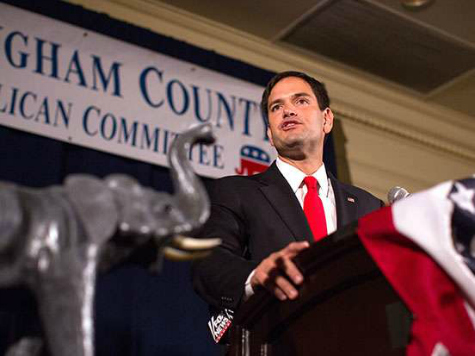
Conservatives who believe that winning back control of the Senate will destroy any chance of amnesty legislation passing are sorely mistaken. In fact, a Republican-controlled Congress may make it easier to provide a path to citizenship for all of the country’s illegal immigrants if this Congress fails to do so.
Sen. Marco Rubio (R-FL), who has his eye on the GOP presidential nomination and was the central figure who backed the Senate’s amnesty bill that passed last year, said that Republicans in the Senate would “absolutely” take up amnesty legislation again if they gain a net of six seats to take back the upper chamber. He indicated that piecemeal or bite-sized bills would be better than his Gang of Eight amnesty bill that he championed and which faced stiff resistance from House conservatives.
If Republicans retain the House, that would mean GOP leaders like Sen. Mitch McConnell (R-KY), who would become Majority Leader, and House Speaker John Boehner (R-OH) may promptly abandon the conservative base to strike a deal on amnesty legislation.
Rubio conceded that he did not “think a comprehensive bill can pass,” but emphasized that he did not “want us to waste another two years on an approach that has no chance of passing.”
“I certainly think we can make progress on immigration, particularly on topics like modernizing our legal immigration system [and] improving our mechanisms for enforcing the law, and I think if you did those things you could actually make some progress on addressing those who are illegally,” Rubio said on Wednesday, according to The Hill.
Sen. Chuck Grassley (R-IA), who would be Chairman of the Judiciary Committee if the GOP takes back the Senate, and Sen. John Cornyn (R-TX), who would become Majority Whip, also agreed.
“We’d start over again next year,” Grassley, who said he supported the amnesty provisions in the Senate bill but not the lax border security measures, told The Hill. “I’d make a decision about whether you could get more done by separate bills or a comprehensive bill.”
Establishment Republican leaders believe the only way a GOP candidate can have a chance in the 2016 presidential election is to pass massive amnesty legislation to win over Hispanic voters. They agree with Chamber of Commerce CEO Tom Donohue’s remarks Monday in which he half-joked, “If the Republicans don’t” pass amnesty legislation, they “shouldn’t bother to run a candidate in 2016.”
The evidence for that sentiment may be lacking, though. Two national surveys have shown that a plurality of voters would be “less likely” to support a candidate who favors amnesty, which could enhance the number of Democrats at the polls, which could make states like Arizona, Texas, and Georgia even more competitive. To complicate matters even more, an Eagle Forum report documented how mass immigration may doom a conservative Republican Party, by depressing conservative voters who may not turn out at the polls like they did not for Mitt Romney in 2012, while perpetually importing more Democrats.
Prominent pro-amnesty liberals like Sen. Chuck Schumer (D-NY) and Rep. Luis Gutierrez (D-IL) have insisted that this year is the last chance to pass sweeping amnesty legislation. For that reason, amnesty advocates have pushed President Barack Obama and House Republicans to act by August while business executives are hoping Congress can pass amnesty as the “final act” of this Congress in the lame-duck session. Conventional wisdom has suggested that Republicans would not want to touch the amnesty issue in the middle of their presidential nominating process.
Rubio disagreed with that assessment, perhaps ensuring that immigration issues which almost doomed Sen. John McCain’s (R-AZ) 2008 candidacy when Republicans as a whole were less conservative than they are now will be front and center in the 2016 GOP presidential primary.
“I don’t agree with that,” Rubio told The Hill. “I understand there’s some conventional wisdom out there in that regard but I don’t believe that to be true.”
The Senate passed an amnesty bill last year that the Congressional Budget Office determined would lower the wages of American workers. Rubio then went silent on amnesty issues as his popularity and star faded. He even backed away from his own bill, refusing to support efforts by pro-amnesty House Republicans to go to conference on his bill. Meanwhile, his standing with the conservative base plummeted, especially in early primary states like Iowa and New Hampshire, two states that will immediately be in the spotlight as the 2016 presidential jockeying gets underway in earnest in 2015.
Pro-amnesty Republican senators will not be able to get amnesty legislation through without a fight from conservative senators like Sens. Jeff Sessions (R-AL) and Ted Cruz (R-TX), who were instrumental in stopping the House from passing amnesty legislation when they deemed the House GOP leadership’s “immigration principles” as “amnesty” earlier this year.
Sessions, who from the outset has been a fierce champion and voice for American workers in opposing the wage-depressing amnesty bill, continued to emphasize that “Washington can’t rewrite the law of supply and demand: we can’t rebuild our middle class if we continue to bring in record numbers of new workers for companies to hire at the lowest available wage.”

COMMENTS
Please let us know if you're having issues with commenting.